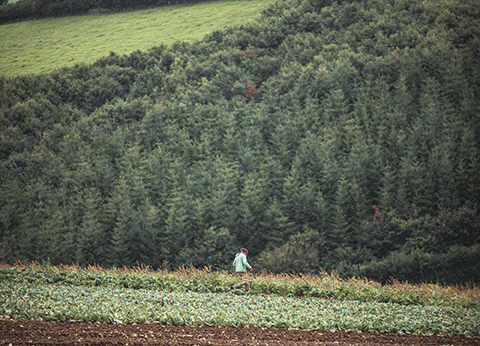My father started farming at Riverford in 1951 with a clarity of purpose I envy today.
Food rationing was still in place and, with memories still fresh of U-boats coming close to starving Britain into submission, farming was an obvious choice for those emerging from the war wanting to contribute positively and “be useful” in a post-colonial era.
As food rationing ended in 1954, the emphasis on home production continued, driven first by the need to conserve foreign exchange (the war left us broke) and later by the politically driven policies of the European Economic Community (EEC). Food self-sufficiency peaked at 78 per cent in 1984; the highest since British agriculture’s golden age in the mid-19th century, and, given our increased population and consumption of meat, an incredible achievement.
With a rise of neoliberal market fundamentalism and protestations from US and World Trade Organization over the dumping of EU surpluses on world markets, subsidies and interventions have been progressively removed through my farming career as farmers were left to go the way of miners, ship builders and steel workers.

UK food self sufficiency now stands at 64 per cent, (a paltry 18 per cent for fruit and 55 per cent for veg) but the price farmers receive has never been cheaper in real terms. With farming now contributing so little to wealth (0.7 per cent of GDP) but so much to environmental degradation (by most measures, about a third), I, like many farmers, feel confused by my role; sometimes guilty, sometimes angry and misunderstood, but mostly just confused and frustrated. As we flounder in the dark of a policy vacuum, I envy the clarity and optimism of my father’s farming era.
We must learn to farm for carbon, biodiversity and food in the same space, with differing local emphasis according to land quality and ecological sensitivity. Our farming must embrace complexity and locally specific mixed farming practices, rewilding of small areas connected in corridors, more perennial crops (mostly trees) and less soil disturbance. Robots, technology and, on rare occasion, vertical farming may play a part, as will greater ecological understanding and more plant-based, seasonal diets.
Market forces or even carbon trading are too clumsy to guide such multifaceted outcomes. We need brave policies delegated to local bodies to enforce. It won’t be easy but it is doable, urgently needed and could be beautiful.















Hello Guy! Talking of confusion, I was wondering what your thoughts are regarding aquaponics. You’ve mentioned fish production in previous articles, and obviously veg production. What about this system called aquaponics? Personally I find it hard to imagine veg growing with no soil, but maybe you could provide myself and other readers with a more critical view. That is if you’re bored on a wet cold autumn morning;-)
Christopher from France.
Now that could be a very interesting discusion, I admit I like the idea but! (life is like an ashtray ~ full of little butts) Is it or could it be adequate to supply the large amount of foodstuff needed in our modern world? From what I’ve seen whlst experients are carried out and some great write-ups are produced the areas experimented on seem fairly small plus I haven’t as yet seen any long term results.
So yes please could we have something on hydroponics / aquaponics (there is a difference I believe)? This could of course be stretched to a fairly frequent discussion on the many and varied methods of farming today – – not only here in Europe but world wide as well!
We do need a large amount of foodstuffs, but actually if we managed to reduce food waste to a bare minimum we certainly wouldn’t need to produce any more than we do today, and quite probably less.
Manduco, that wasn’t the main point of my comment which was, if we had to replace ALL of the soil grown food stuffs could aqua/hydro ponics replace it? My appoligies if I didn’t put that across in the way I meant
the Walrus
My question re growing crops not in soil is this. They may look like, say a lettuce, but do they have the same nutritional qualities as those grown in well nurtured, living, organic soils?
I absolutely don’t envy the farming community in the face of the current government’s competency, however, your penultimate paragraph suggests that you and other organic farmers completely do know what needs to be done but need the support of consumers and voters to do it.
We the consumers and voters need to continue to press the government to move in the right direction or at least be clear in what direction they are moving in so that we can make an informed decision about whether we agree with that or not.
Food security is certainly an important factor but equally food miles and packaging should also factor into the pricing of food – polluter pays and we the consumer of Kenyan green beans are the polluter.
Also sadly we as a nation have still do not have to mindset that values our food and the experience of cooking and eating over shopping for more stuff like gadgets, clothes etc that we don’t need but hopefully we will get there.
What makes me nervous is the waffle or worse the silence from the policy-makers which either suggests cluelessness, lack of concern or both.
If we leave it up to the politicians – we are doomed!
We need farmers (like Guy) with experience and knowledge to be listened to by government – we can do our part by telling the politicians what we think…. BUT unfortunately after 40 years of trying to get politicians to listen to their electorate – I don’t hold out much hope!
Get growing your own…..